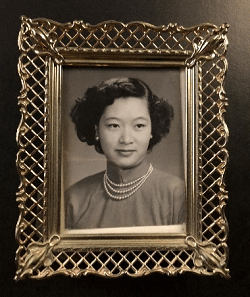Take A Page From Amazon's Playbook To Transform Clinical Trials
By Kenneth Wu
 Around the holidays, I reminisce about family dinners: three generations under one roof for a few hours, catching up on the past year. My mother presided over the festivities for several decades until her passing. For 10 years, she was a survivor of a rare cancer. She had two surgical resections and treatments before the cancer returned. There was only one approved orphan drug, which was 50 percent effective in decreasing mortality for six months. There weren’t many options in clinical trials and no Internet patient-centric community for information and support.
Around the holidays, I reminisce about family dinners: three generations under one roof for a few hours, catching up on the past year. My mother presided over the festivities for several decades until her passing. For 10 years, she was a survivor of a rare cancer. She had two surgical resections and treatments before the cancer returned. There was only one approved orphan drug, which was 50 percent effective in decreasing mortality for six months. There weren’t many options in clinical trials and no Internet patient-centric community for information and support.
Since my first Amazon article, readers contacted me about Amazon-like transformations in clinical research. I never expected clinical research trends to emulate Amazon’s playbook. Fortunately, there have been many advancements since my mother’s diagnosis.
Remove Friction For Patient Participation
In 2014, the Ice Bucket Challenge raised $15.6 million for the ALS (amyotrophic lateral sclerosis) Association.1 The social media success raised national awareness for ALS. But clinical research participation needs to be easier than pouring a bucket of ice.
The alsa.org website has a clinical trials database organized by geography, trial stage, and entry criteria. Patients must email their information and wait for a response. The majority of clinical trial centers are academic medical research facilities, and not all states have participating clinical trial sites. Could enrollment be shortened to something like Amazon’s one-click ordering?
What if patients signed up to a study registry, like Amazon Prime?
- Registrants are notified of clinical trials by email.
- E-consents are on the website.
- Screening is completed at home or by cell phone.
- Follow-up visits are via Echo Show conferencing (Amazon’s video calls).
- Appointments and transportation are scheduled with Alexa (Amazon’s digital assistant).
Meet Patients Where They Live
Amazon’s online store is challenging Walmart’s brick-and-mortar retail empire with online and mobile shopping channels. Amazon’s store is in most people’s pockets and homes, as close as your cell phone, desktop, or Alexa.
In contrast, most clinical trials are in academic centers or clinical practices in urban centers. Unless patients live nearby, participation requires hours of travel. Geography limits access for the majority of the population. Patients may also have physical limitations that restrict their ability to leave their homes.
These limitations have a clear effect on participation. In the landmark heart failure trial COMPANION, 1,520 enrolled patients demonstrated the effectiveness of cardiac resynchronization therapy that has become the standard of care.2 One hundred sites enrolled 1,500 patients — is just 0.02 percent of the total U.S. heart failure patients — in two years. What if lifesaving clinical trials could be shortened to benefit more patients sooner?
How much faster could medical milestones be achieved if geography did not restrict patient access? Technology is heading toward this change. Medtronic services over 95,000 patients with remote monitoring. NetResponse is used with smartphones, tablets, and personal computers. Patient data is monitored by clinicians to facilitate care. Weight scales, glucometers, blood pressure monitors, pulse oximeters, spirometers, pedometers, stethoscopes, and activity trackers can upload data to patient platforms.3

Clinical research companies, such as Elligo Health Research, have an innovative approach to connect patients to clinical trials through their physicians. In cooperation with physicians, Elligo searches electronic health records (EHRs) to identify eligible patients for existing trials. The company provides physicians with infrastructure free of charge to conduct the trials.4 Patients can enroll in clinical trials and continue seeing their own physicians.
Another option is through clinical research companies that send clinicians to study patients’ homes, offices, or workplaces for the scheduled study visit. Symphony Clinical Research partners with investigators and sponsors to bring the study to the patient. Symphony provides in-home clinical services on six continents.5
Amazon transformed the value chain by removing friction between buyers and sellers and marketed directly to buyers’ need for convenience, low prices, and greater selection. Previous patient barriers to clinical trials such as travel, cost, and access can be removed. Companies like Symphony and Elligo “can connect the 97 percent of physicians and patients not currently participating in clinical research.”5
Make Trials Patient-Centric
I consult in rare disease indications. In one clinical trial, all enrolled subjects in the first month were referred through a patients’ network for rare diseases. Not a single subject was referred by their physician! Our first trial was designed from the patients’ perspective. We removed as many barriers to participation as possible. We scheduled appointments according to patients’ schedules and sent clinicians to patients’ homes, offices — wherever they were available. We demonstrated that clinical research can be successful without limitations of resource, time, schedule, or geography.
My mother volunteered for the city of Oakland, visiting homebound, elderly, Chinese-speaking clients. Though the cancer slowed her down, she didn’t waver in her commitment to helping others with her time and talent. If enrolling in a clinical trial had allowed her to continue seeing her oncologist, participation in clinical research would have been a viable option. Many cancer survivors would eagerly volunteer in studies if their commitment would benefit others. Amazon works aggressively to exceed customer expectations — sometimes at the cost of profits. Clinical research can benefit from an Amazon disruption to engage more patients. It’s no longer a matter of capabilities, but of willingness to engage.
References
- Lee, J., “What’s the real impact of viral Ice Bucket Challenge?”, USA Today Network, August 18, 2014.
- Bristow, M.R., et al, “Cardiac-resynchronization therapy with or without an implantable defibrillator in advanced chronic heart failure”, The New England Journal of Medicine, May 20, 2004.
- See http://www.medtronic.com/us-en/healthcare-professionals/services/care-management-services/remote-patient-monitoring.html
- See https://www.elligohealthresearch.com
- See https://www.symphonyclinicalresearch.com
 About The Author:
About The Author:
Kenneth Wu has been consulting in clinical operations for biopharmaceutical and medical device sponsors for over a decade. His professional career advanced from clinical research associate (CRA) to clinical operations department head. He holds graduate degrees in physiology and business administration and is certified in both clinical and regulatory affairs.
